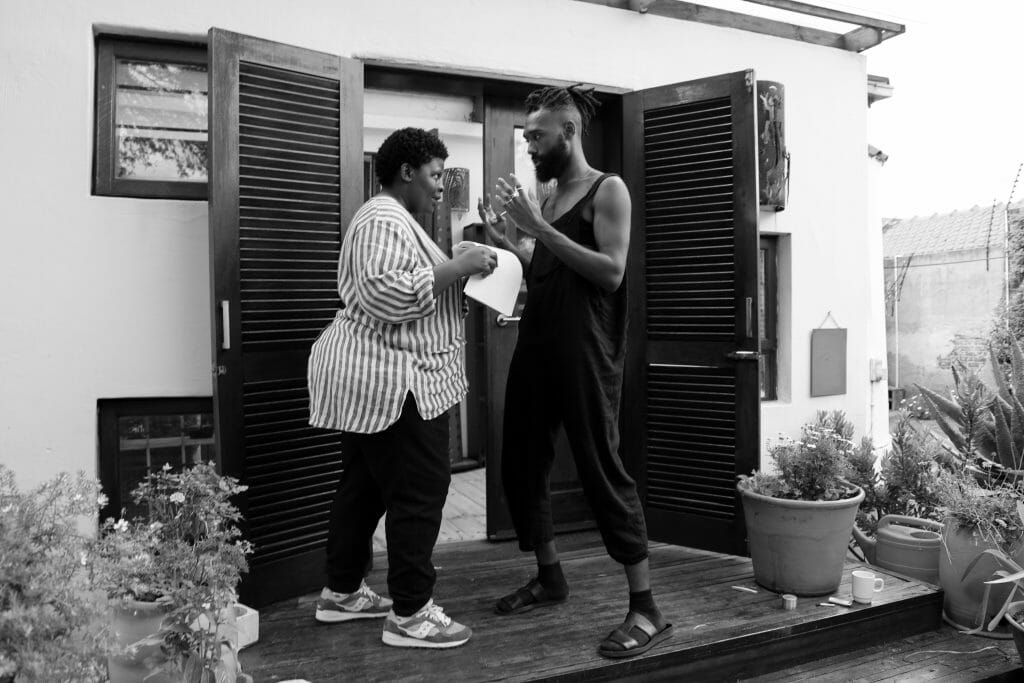By: Elijah McKinnon, Contributing Writer
#LightsCameraHarm is an in-depth report that provides critical tools, practices, and recommendations to examine harm and seek repair in the Film/TV industry after findings reveal over 98% of respondents have witnessed inappropriate behavior or comments, harm, or hostility when working on production.
Twiggy Matiwana (left) and Elijah McKinnon (right) on the set of THANDO, a short-film streaming exclusively via Open Television (OTV).
Over the past 5 years, the film, television, and media industry has slowly begun to engage in a much-needed conversation surrounding the harmful systems that perpetuate violence, conflict, and abuse in and out of production spaces. Fueled by a sobering pandemic and global uprisings for social justice, 2020 marked a seismic shift in the ways below-and-above-the-line workers advocate for more equitable conditions that provide space for healthier work environments. To better understand how harm shows up in our community, on film/television sets, and in places we may not know, Emmy-nominated platform Open Television (OTV) partnered with the Black and non-binary-led research and change management firm, MMG EARTH to build an initiative that would breathe life into how we might begin to manifest a shared language for seeking repair.

Quinton Sea Manning (left) and Zolani Shangase (right) on the set of THANDO, a short-film streaming exclusively via Open Television.
#LightsCameraHarm is an in-depth research initiative examining the film, television, and media industry’s approach to addressing harm and seeking repair for professionals that are often marginalized by their race, gender, sexuality, citizenship, nationality, and ability. The purpose of this report is to uncover trends that can help develop processes and structures for accountability related to sexual harassment, disrupting and stopping harm, and accepting and offering conditions for restoration individually, interpersonally, ideologically, and institutionally. Focusing on the western film and television industry, #LightsCameraHarm activated an extensive community outreach process which resulted in a survey, interviews, and industry research to inform findings. There are many individuals that benefit from this report, but the intended audiences are indie artists and creators, production leaders, and streaming and studio executives.
#LightsCameraHarm with Elijah McKinnon of OTV | Open Television via The Art Works Fund.
It’s no secret that media-driven industries have been rooted in harmful, toxic, and inequitable distributions of power. When asked, “what does harm look like and who is harm?,” over 98% of respondents said they have witnessed inappropriate behavior or comments, harm, or hostility when working on production, and over 60% said they have personally experienced it at work. This further illustrates the complex nature of how the industry perpetuates an environment that allows hostility and harm to flourish.
Broken into four sections, the #LightsCameraHarm report shares community-sourced recommendations, guiding principles, and ethical concepts that film, television, and entertainment communities can utilize as resources for developing more care-centered production practices. The sections are as follows:
1. Past: How did we get here?
2. Present: What does harm look like?
3. Present: What does repair look like?
4. Future: How are people re-imagining?
Each present and Future section is comprised of Findings, Recommendations, and Guides & Resources. In addition to a comprehensive list of resources, #LightsCameraHarm also includes a report summary entitled “TL;DR: Report Overview.” This section of the report seeks to provide a concise overview of the findings and recommendations. The full report engages in an ongoing dialouge that anchors OTV’s dual culture strategy, which exists to repair our current media landscape while simultaneously building a new one that is rooted in collective power.

Crew on the set of THANDO, a short-film streaming exclusively via Open Television.
#LightsCameraHarm is not an answer or a solution. It is an open-ended resource and invitation to industry leaders, workers, and creatives interested in ushering in the next generation of storytellers that are armed with the tools to face harm and seek repair. The future of storytelling is intersectional and depends on our collective bravery.
To learn more, read the full #LightsCameraHarm Report or listen to #LightsCameraHarm Podcast with OTV’s Co-founder Elijah McKinnon. #LightsCameraHarm Research Project and Report is generously supported by a grant from The Art Works Fund.













